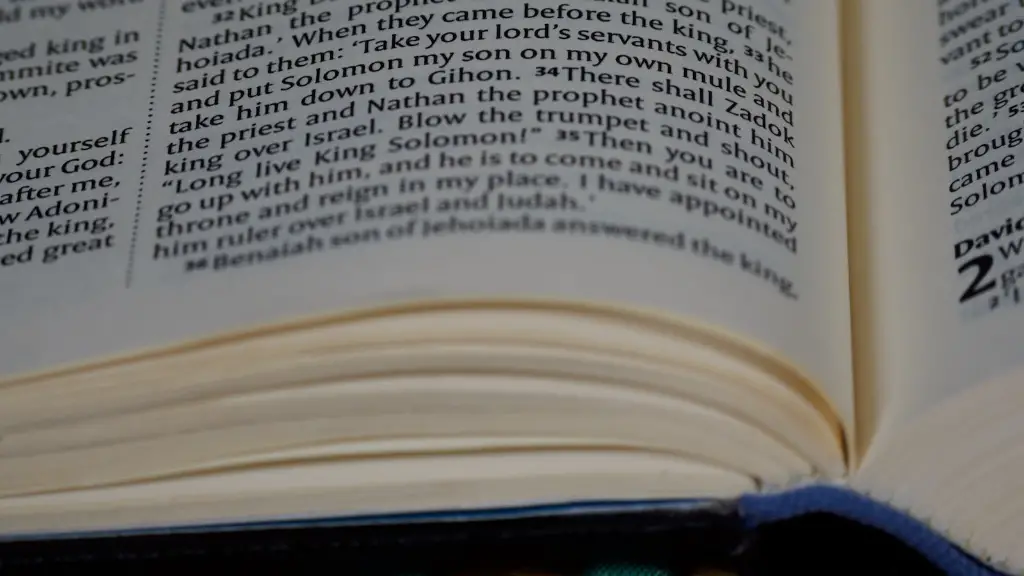Understanding Gratitude
Gratitude is an emotion and a fundamental element of everyday life. It’s expressed in countless ways, from saying prayers of thanks to appreciating the special little things that make life worth living. But what does the Bible say about gratitude? Understanding what the core scriptures say can provide great insight into the importance of this emotion and how we can all make gratitude a part of our lives.
The Bible speaks of gratitude in many ways. An overarching theme found in the Old and New Testaments is the need to be grateful and to recognize the many blessings bestowed upon us. In the New Testament, for example, Jesus praises His disciples for giving Him thanks for their many blessings. Elsewhere, He speaks of the need for us to express our gratitude unto God as well as to one another. The book of Psalms contains several passages in which God encourages us to be thankful for what we have and to give thanks in all situations.
In addition to these scriptures, the Bible also often uses the concept of gratitude to describe behavior and attitudes. As an example, the book of Proverbs talks about the importance of saying thank you and acknowledging others’ kindness or gifts, while the book of Hebrews speaks of the need to show thankfulness for the many blessings of grace bestowed upon us on a daily basis.
The Bible even teaches that we should be grateful for our sufferings, because in them we can learn and grow. In the book of Romans, for example, the Apostle Paul speaks of the need to be thankful for our trials and tribulations, as they often lead to greater insight and maturity. Likewise, the book of James describes how trials can serve as a reminder of God’s love for us and how we should be grateful for whatever we endure in life.
It’s clear that throughout the scriptures, gratitude plays an incredibly important role in our lives. It’s not simply something nice to do, but something absolutely essential.
Practicing Gratitude
As an expression of faith, gratitude must be intentional. It’s not enough to simply think about being grateful; we must actively take part in expressing it. One way to do this is by saying prayers of gratitude to God. In addition to speaking our gratitude through prayer, we can also express it through actions. Showing gratitude by sharing our blessings with others or engaging in acts of kindness can be a great way to show our appreciation for all we have been given.
In the Bible, we have several examples of individuals expressing gratitude and thanking God for their blessings. Abraham, for example, was known for giving thanks to God for the abundant blessings bestowed upon him, as did Joseph and other leading figures in the Bible. By following in their footsteps, we can also express our gratitude for God’s many gifts – both large and small.
The book of Proverbs also offers practical advice for expressing gratitude. For example, it teaches us to show sincerity in our thanks, to thank people without expectation, and to give in order to receive. The book of Romans encourages us to be generous with our praise, while the book of Hebrews speaks of how gratitude can lead to inner peace and harmony.
Finding Gratitude
Although expressing gratitude can sometimes be challenging – especially when we are afraid or overwhelmed – the scriptures tell us it is essential to do so. It’s important to remember that gratitude is a choice that we can make. The good news is that it’s a choice that can be made even during difficult times. In the book of 1 Thessalonians, the Apostle Paul tells us to “give thanks in all circumstances” and to remember that “God works for the good of those who love Him” (1 Thessalonians 5:18).
This means that even in hard times, we can search for moments of gratitude and thank God for His blessings. When we look for these moments, we often find that they are everywhere – from the beauty of the surrounding landscape to the love of the people in our lives. And, as we express our thanks, these moments of gratitude can help us to cope with our difficulties and find peace of mind.
The good news is that gratitude doesn’t always come as naturally as it should. We can develop our capacity for gratitude by making a conscious effort to think about all that we have been given and to express our thanks. Taking time each day to appreciate the blessings in our lives can help us refocus our attention and reset our perspective.
Expanding Gratitude
In order to help us understand what the Bible teaches about gratitude, we can look to the example of Jesus, who expressed gratitude for so many aspects of life. He looked upon even the most mundane of tasks, like baking bread or curing illness, with immense appreciation and thanked God for the blessings they brought. Jesus also asked His disciples to appreciate the little things they had been given, as well as the beautiful scenery that surrounded them.
By taking on Jesus’s example, we can cultivate a greater sense of gratitude. We can look beyond our own needs and see the value in all opportunities, even the ones that sometimes seem trivial or mundane. We can show our thankfulness for the beauty of creation and the blessings that come with it. We can also remember that we are blessed to be alive and express our gratefulness to God and to all of those who have helped us along the way.
Leveraging Gratitude
The Bible teaches us that thankfulness can also be powerful – both emotionally and spiritually. Through our gratefulness and expressions of thanks, we can create meaningful connections and relationships, which can help us to grow and to live more meaningful lives.
Showcasing our gratitude can also provide a sense of comfort and peace, as it reminds us of how blessed we are and that there is light at the end of difficult roads. Expressing gratitude can also help to relieve stress and can become an important part of our daily spiritual practice.
Gratitude is also a great way to reach out to those we may not otherwise have the opportunity to connect with and to make the world a better place. Showing thankfulness and appreciation for the things people do for us can open up new doors and opportunities for us and for those around us.
Demonstrating Gratitude
The Bible has much to say about gratitude and how we should express it. Ultimately, it comes down to recognizing all the blessings God has bestowed upon us and expressing our thanks for them in meaningful ways. This can be done through prayer, by thanking others, and by taking part in acts of kindness and generosity.
When we express our gratitude to God and to those around us, it can remind us that we are all part of a larger story and that the world is full of blessings. At the same time, it can also help us to live more deeply and to appreciate each and every moment of life. By taking on the teaching of the Bible and demonstrating our gratitude to God and others, we can live more fulfilling and meaningful lives.

